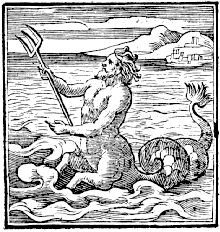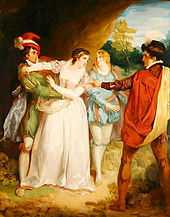Proteus
| Greek deities series | |
|---|---|
| Primordial deities | |
| Titans and Olympians | |
| Chthonic deities | |
| Personified concepts | |
| Other deities | |
| Aquatic deities | |
In Greek mythology, Proteus (Πρωτεύς) is an early sea-god or god of rivers and oceanic bodies of water, one of several deities whom Homer calls the "Old Man of the Sea".[1] Some who ascribe to him a specific domain call him the god of "elusive sea change", which suggests the constantly changing nature of the sea or the liquid quality of water in general. He can foretell the future, but, in a mytheme familiar to several cultures, will change his shape to avoid having to; he will answer only to someone who is capable of capturing him. From this feature of Proteus comes the adjective protean, with the general meaning of "versatile", "mutable", "capable of assuming many forms". "Protean" has positive connotations of flexibility, versatility and adaptability. The earliest attested form of the name is the Mycenaean Greek 𐀡𐀫𐀳𐀄 po-ro-te-u, written in Linear B syllabic script.[2]
Etymology
Proteus' name suggests the "first" (from Greek "πρῶτος" - protos, "first"), as protogonos (πρωτόγονος) is the "primordial" or the "firstborn". It is not certain to what this refers, but in myths where he is the son of Poseidon, it possibly refers to his being Poseidon's eldest son, older than Poseidon's other son, the sea-god Triton.
In Greek mythology

According to Homer (Odyssey iv:412), the sandy island of Pharos situated off the coast of the Nile Delta was the home of Proteus, the oracular Old Man of the Sea and herdsman of the sea-beasts. In the Odyssey, Menelaus relates to Telemachus that he had been becalmed here on his journey home from the Trojan War. He learned from Proteus' daughter, Eidothea ("the very image of the Goddess"), that if he could capture her father he could force him to reveal which of the gods he had offended, and how he could propitiate them and return home. Proteus emerged from the sea to sleep among his colony of seals, but Menelaus was successful in holding him, though Proteus took the forms of a lion, a serpent, a leopard, a pig, even of water or a tree. Proteus then answered truthfully, further informing Menelaus that his brother Agamemnon had been murdered on his return home, that Ajax the Lesser had been shipwrecked and killed, and that Odysseus was stranded on Calypso's Isle Ogygia.
According to Virgil in the fourth Georgic, at one time the bees of Aristaeus, son of Apollo, all died of a disease. Aristaeus went to his mother, Cyrene, for help; she told him that Proteus could tell him how to prevent another such disaster, but would do so only if compelled. Aristaeus had to seize Proteus and hold him, no matter what he would change into. Aristeus did so, and Proteus eventually gave up and told him that it was a punishment for causing the death of Eurydice. To make amends he must sacrifice 12 animals to the gods, leave the corpses in the place of sacrifice, and return three days later. When Aristaeus returned after the three days he found in one of the carcasses a swarm of bees, which he took to his apiary. The bees were never again troubled by disease.
The children of Proteus, besides Eidothea, include Polygonus and Telegonus, who both challenged Heracles at the behest of Hera and were killed, one of Heracles' many successful encounters with representatives of the pre-Olympian world order.
Another Proteus occurs in Greek myth as one of the fifty sons of King Aegyptus.
Proteus of Egypt
In the Odyssey (iv.430ff) Menelaus wrestles with "Proteus of Egypt, the immortal old man of the sea who never lies, who sounds the deep in all its depths, Poseidon's servant" (Robert Fagles's translation). Proteus of Egypt is mentioned in an alternate version of the story of Helen of Troy in the tragedy Helen of Euripides (produced in 412 BC). The often unconventional playwright introduces a "real" Helen and a "phantom" Helen (who caused the Trojan War), and gives a backstory that makes the father of his character Theoclymenus, Proteus, a king in Egypt who had been wed to a Nereid Psamathe. In keeping with one of his themes in Helen, Euripides mentions in passing Eido ("image"), another unseen daughter of the king. The play's king (never seen) is only marginally related to the "Old Man of the Sea"[3] and should not be confused with the sea god Proteus.
At Pharos—in Hellenistic times the site of the Lighthouse of Alexandria were indivisible, (in modern Greek the word still has the meaning "lighthouse)—a king of Egypt named Proteus welcomed Dionysus in the young god's wanderings.
In alchemy and psychology
The German mystical alchemist Heinrich Khunrath wrote of the shape-changing sea-god who, because of his relationship to the sea, is both a symbol of the unconscious as well as the perfection of the art. Alluding to the scintilla, the spark from ‘the light of nature’ and symbol of the anima mundi, Khunrath in Gnostic vein stated of the Protean element Mercury:
our Catholick Mercury, by virtue of his universal fiery spark of the light of nature, is beyond doubt Proteus, the sea god of the ancient pagan sages, who hath the key to the sea and …power over all things.
In modern times, the Swiss psychologist Carl Jung defined the mythological figure of Proteus as a personification of the unconscious, who, because of his gift of prophecy and shape-changing, has much in common with the central but elusive figure of alchemy, Mercurius.
In literature
The poet John Milton, aware of the association of Proteus with the Hermetic art of alchemy, wrote in Paradise Lost of alchemists who sought the philosopher's stone:
In vain, though by their powerful Art they bind
Volatile Hermes, and call up unbound
In various shapes old Proteus from the Sea,
Drain'd through a Limbec to his native form.— John Milton, Paradise Lost, III.603–06
In his 1658 discourse The Garden of Cyrus, Sir Thomas Browne, pursuing the figure of the quincunx, queried:
Why Proteus in Homer the Symbole of the first matter, before he settled himself in the midst of his Sea-Monsters, doth place them out by fives?
Shakespeare uses the image of Proteus to establish the character of his great royal villain Richard III in the play Henry VI, Part Three, in which the future usurper boasts:
I can add colors to the chameleon,
Change shapes with Proteus for advantages,
And set the murderous Machiavel to school.
Can I do this, and cannot get a crown?
Tut, were it farther off, I'll pluck it down.— William Shakespeare, Henry VI, Part Three, Act III, Scene ii
Shakespeare also names one of the main characters of his play The Two Gentlemen of Verona Proteus. Inconsistent with his affections, his deceptions have unraveled at the finale of the play as he is brought face-to-face with his friend Valentine and original love Julia:
O Heaven, were man
but constant, he were perfect: that one error
fills him with faults; makes him run through all sins
Inconstancy falls off, ere it begins.
In 1807, William Wordsworth finished his sonnet on the theme of a modernity deadened to Nature, which opens "The world is too much with us", with a sense of nostalgia for the lost richness of a world numinous with deities:
…I'd rather be
A Pagan suckled in a creed outworn;
So might I, standing on this pleasant lea,
Have glimpses that would make me less forlorn;
Have sight of Proteus rising from the sea.
Or hear old Triton blow his wreathèd horn.[4]
Proteus is the name of the submarine in the original story by Otto Klement and Jay Lewis Bixby, which became the basis for the 1966 film Fantastic Voyage and Isaac Asimov's novelization.
John Barth's novelette "Menelaiad" in Lost in the Funhouse is built around a battle between Proteus and Menelaus. It is told as a multiply-nested frame tale, and the narrators bleed into each other as the battle undermines their identities.
The alien character of Prot in the book trilogy by Gene Brewer and played by Kevin Spacey in the movie K-PAX, like Proteus was said to embody, was a modernized "shape shifter" and magical type of advanced mystical ET who "walked in" to humanoid bodies, and shared wisdom and insights into the human condition.
The crew of the Jupiter 2 in the 1998 film Lost in Space encounter and board a derelict space station named the Proteus.
In the Harry Potter series, Hermione Granger casts a Protean charm (named after Proteus) on galleons (a form of wizarding currency) to inform members of Dumbledore's Army of meetings. When she changes the properties of the original coin, the amendments are reflected on those she has given to other people to display the date.
See also
| Wikimedia Commons has media related to Proteus. |
Notes
- ↑ See also Nereus and Phorcys
- ↑ Palaeolexicon, Word study tool of ancient languages
- ↑ Helen, Euripides, Nottingham.
- ↑ Wordsworth.
References
- Karl Kerenyi, The Gods of the Greeks
- Robert Graves, The Greek Myths
- E. Prioux, «Géographie symbolique des errances de Protée : un mythe et sa relecture politique à l’époque impériale», in A. Rolet (dir.), Protée en trompe-l'œil. Genèse et survivances d'un mythe, d'Homère à Bouchardon (Paris, P.U.R., 2009), p. 139-164 (Interférences).
- A. Scuderi, Il paradosso di Proteo. Storia di una rappresentazione culturale da Omero al postumano, Carocci, Collana Lingue e letterature n.147, Roma, 2012. ISBN 9788843067190
| |||||||||||||||||||
